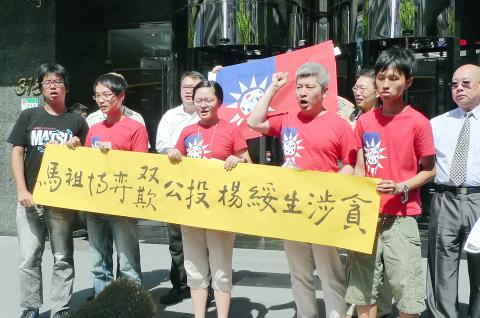The Alliance Against the Legalization of Gambling yesterday protested in front of the Agency Against Corruption following the results of a referendum last weekend which favored the construction of a casino resort on Matsu and said the agency must investigate the possibility of vote-buying during the referendum campaign.
The alliance’s executive director Ho Tsung-hsun (何宗勳), accused Weidner Resorts Taiwan — the developer behind a planned casino resort on the island — and Lienchiang County Government of deceiving residents by making unrealistic promises, such as promising monthly subsidies of NT$80,000 for Matsu residents, saying the promises were tantamount to vote-buying.
Ho said Lienchiang County Commissioner Yang Sui-sheng (楊綏生) published several articles in local newspapers to promote the casino proposal before the referendum took place and he even used public funds to buy ad space in newspapers which were designed to promote the proposal, which Ho said violated the administrative neutrality principle.

Photo: Chang Wen-chuan, Taipei Times
Ho also said Yang used the Matsu Daily, a mouthpiece of the county government, to promote the alleged advantages of the establishment of casino resorts and to influence the residents’ decision.
Ho described the popular poll as a “cheating referendum.” The alliance delivered a letter of complaint to the agency, urging it to launch an investigation.
Ho added the alliance would also file a suit with the Central Election Committee requesting that the referendum be nullified
Residents of Matsu on Saturday voted in favor of the construction of casino resorts on the outlying islands. Fifty-six percent voted in favor of the initiative, while 42 percent opposed it.
The groups said they planned to launch another referendum in three years to keep the gambling industry out of Matsu.
“In fact, the result of the referendum was not surprising,” said Buddhist Master Shih Chao-hui (釋昭慧), convener of the Alliance Against the Legalization of Gambling.
“If not for the effort of the alliance to raise anti-gambling awareness on the islands, the opposition would have secured less than 20 percent of the total votes,” she said.
The referendum and the project are not only meaningful to the residents of Matsu, but also to people in other parts of Taiwan, the master added.
If a casino resort is allowed to be established in Matsu, more casinos would be built in other regions in the country in the future, she said, adding that is why the alliance is planning to stage an anti-gambling referendum in three years.
The Referendum Act (公民投票法) stipulates that, whether a referendum proposal is adopted or vetoed, no more proposals may be raised on the same matter within three years.

Chinese spouse and influencer Guan Guan’s (關關) residency permit has been revoked for repeatedly posting pro-China videos that threaten national security, the National Immigration Agency confirmed today. Guan Guan has said many controversial statements in her videos posted to Douyin (抖音), including “the red flag will soon be painted all over Taiwan” and “Taiwan is an inseparable part of China,” and expressing hope for expedited reunification. The agency last year received multiple reports alleging that Guan Guan had advocated for armed reunification. After verifying the reports, the agency last month issued a notice requiring her to appear and explain her actions. Guan

GIVE AND TAKE: Blood demand continues to rise each year, while fewer young donors are available due to the nation’s falling birthrate, a doctor said Blood donors can redeem points earned from donations to obtain limited edition Formosan black bear travel mugs, the Kaohsiung Blood Center said yesterday, as it announced a goal of stocking 20,000 units of blood prior to the Lunar New Year. The last month of the lunar year is National Blood Donation Month, when local centers seek to stockpile blood for use during the Lunar New Year holiday. The blood demand in southern Taiwan — including Tainan and Kaohsiung, as well as Chiayi, Pingtung, Penghu and Taitung counties — is about 2,000 units per day, the center said. The donation campaign aims to boost

The Kaohsiung Tourism Bureau audited six hotels in an effort to prevent price gouging ahead of Korean band BTS’ concert tour in the city scheduled for Nov. 19, 21 and 22 this year. The bureau on Friday said that the audits — conducted in response to allegations of unfair pricing posted on social media — found no wrongdoing. These establishments included the local branches of Chateau de Chine, Hotel Nikko, My Humble House, and Grand Hai Lai, it said, adding that the Consumer Protection Commission would have penalized price gougers had the accusations been substantiated. The bureau said the Tourism Development Act

The Central Weather Administration (CWA) said a magnitude 4.9 earthquake that struck off the coast of eastern Taiwan yesterday was an independent event and part of a stress-adjustment process. The earthquake occurred at 4:47pm, with its epicenter at sea about 45.4km south of Yilan County Hall at a depth of 5.9km, the CWA said. The quake's intensity, which gauges the actual effects of a temblor, was highest in several townships in Yilan and neighboring Hualien County, where it measured 4 on Taiwan's seven-tier intensity scale, the CWA said. Lin Po-yu (林柏佑), a division chief at the CWA's Seismological Center, told a news conference